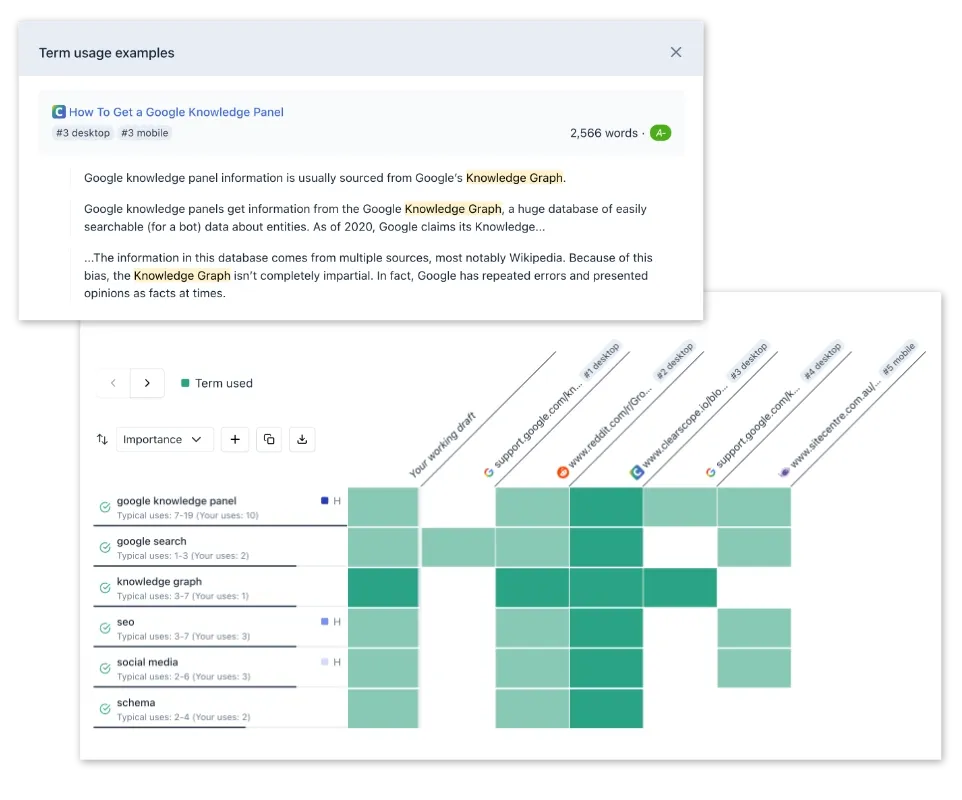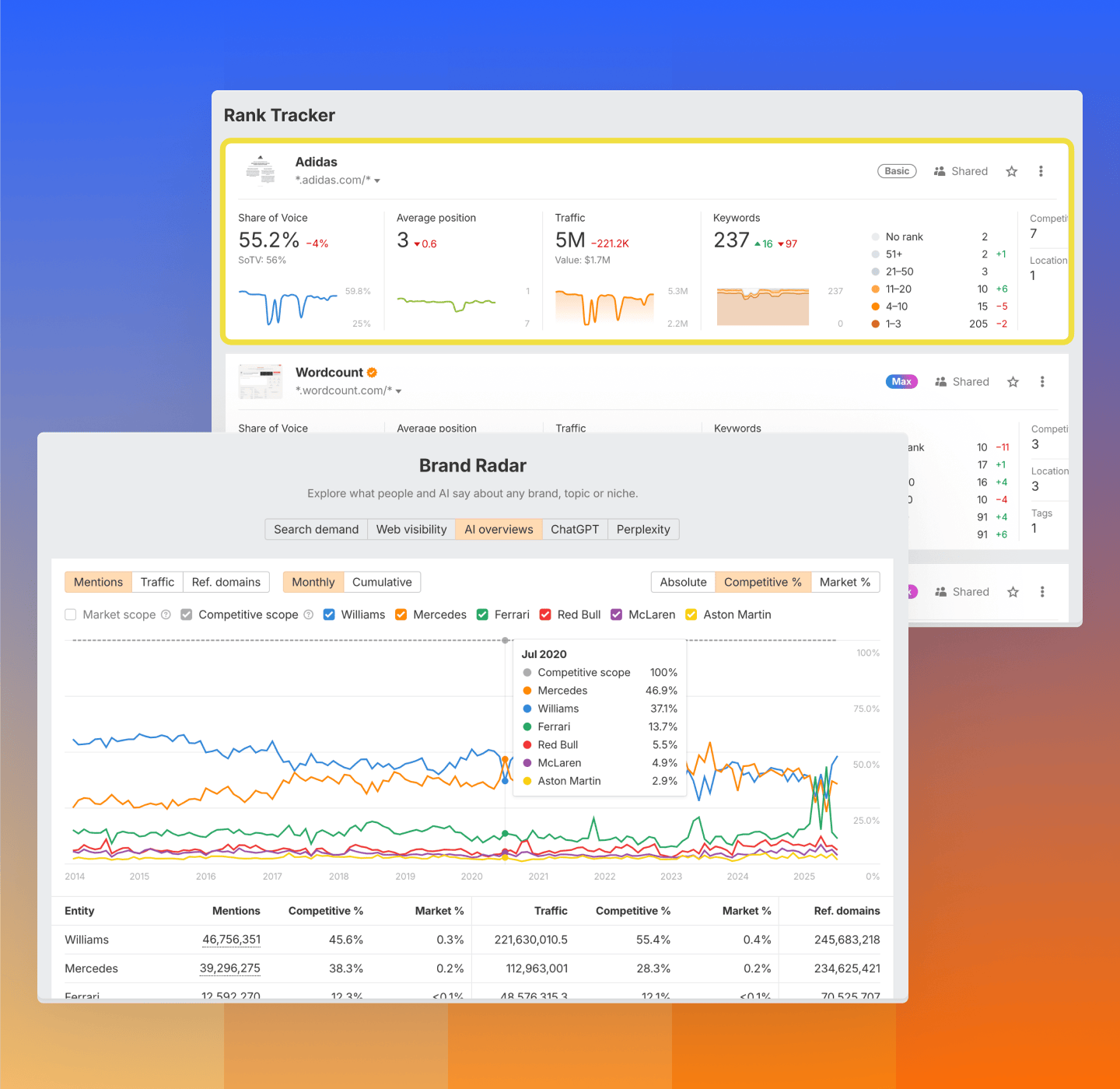How Marketers Use AI
Marketing teams today rely on AI for far more than copywriting. With AI SEO visibility solutions, it's even more achievable.
According to surveys from Gartner and HubSpot, over 60% of marketers already use AI tools weekly, and the top applications include:
- Content Generation: From blog drafts to ad copy, marketers save hours by letting AI handle first drafts.
- Data Analysis: AI models process SERP data, keyword clusters, and engagement metrics faster than human analysts.
- Personalization: Dynamic web experiences powered by AI adapt messaging in real time based on user intent.
- Predictive Analytics: Marketers use machine learning to forecast campaign ROI and traffic growth.
- SEO Automation: Tasks like schema generation, internal linking suggestions, and topic clustering are now AI-powered.
The biggest takeaway? AI isn’t just about efficiency, it allows marketers to align strategies with the future of artificial intelligence search engine optimization, where search engines themselves are becoming AI-driven.
How to Use AI for SEO
So, how can you apply AI practically to your SEO strategy? Here’s a framework that works across industries:
- Research Smarter
AI keyword tools don’t just give you volume data; they uncover search intent and long-tail opportunities. This helps you compete where traditional SEO would overlook. - Create Optimized Content
Tools like Jasper and Surfer ensure your content isn’t just well-written, but also aligned with semantic search and generative engine results. - Automate Technical SEO
AI can scan for broken links, improve site architecture, and even recommend schema markup for better visibility in rich results. - Leverage Predictive Insights
Instead of reacting to drops in traffic, AI models can predict performance trends, giving you time to pivot before visibility slips. - Optimize for Generative Search
As search shifts to conversational, artificial intelligence SEO requires content structured for Q&A formats, context-rich answers, and entity-based optimization. Learn more in our Generative Engine Optimization deep dive.
By combining these approaches, businesses future-proof their visibility and stay competitive in an AI-first search landscape.
14 Best AI SEO Tools You Should Use
1. Surfer SEO – Content + AI for On-Page Wins
Pricing: Surfer SEO has a tiered subscription model. The main publicly listed plans are:
- Essential: ~$99/month (or ~$79/month when billed annually)
- Scale: ~$219/month (or ~$175/month annually)
- Enterprise: Custom pricing for large needs.
Surfer combines NLP algorithms with content optimization. Enter a keyword and it benchmarks your draft against top-performing pages. Its AI-driven recommendations help you cover semantic gaps.
Best use case: Writing long-form blogs optimized for artificial intelligence search engine optimization queries.
What I Like: The Content Editor with NLP support has been especially useful, as I’ve found that Surfer helps me spot semantic gaps I might otherwise miss, nudging me to include related phrases and entities so my articles aren’t just keyword-stuffed but more context-rich.
The AI-generated drafts, when available, are also valuable for accelerating the first-draft process—though I still edit heavily, they cut my drafting time by about 30–50%.
I also appreciate the intuitive UI; navigating between SERP analysis, content auditing, and optimization feels smooth, and as someone managing multiple client sites, having consistent workflows is a real advantage.
That said, there are downsides: sometimes the tool encourages copying structural patterns too closely, which risks making the writing feel repetitive, and the costs can ramp up quickly at scale.

2. Clearscope – Semantic SEO at Scale
Clearscope scans top-ranking content and generates semantic recommendations. Its strength lies in making sure your content matches user intent.
Pricing: Plans start around $170/month for individuals and scale up for teams.
What I Like: I like how Clearscope takes the guesswork out of semantic coverage. When I refresh older blogs, it quickly shows me which terms I’ve overlooked. It’s like having a coach who reminds me, “Here’s what your audience expects to see.” The content scores also give me confidence before hitting publish.
Best use case: Refreshing older blogs that are losing visibility.

3. Jasper – AI Writing Assistant
Jasper speeds up content production by generating human-like text aligned with SEO goals. You can feed it brand voice, tone, and SERP insights.
Pricing: Starts at around $39/month for individuals, with business plans going into the hundreds depending on scale.
What I Like: Jasper feels like having a brainstorming partner. I like using it for first drafts because it adapts to brand voice better than most AI tools I’ve tried. It doesn’t eliminate editing, but it cuts the intimidation of a blank page. For product descriptions, it saves me hours.
Best use case: Scaling product descriptions and FAQ pages.

4. Copy.ai – Rapid Content Prototyping
Copy.ai is useful for brainstorming outlines, ad copy, and quick SEO snippets.
Pricing: A free plan is available, with paid tiers starting at about $49/month.
What I Like: I love how lightweight Copy.ai feels. It’s fast, simple, and great for those little SEO tasks—like meta descriptions or ad copy—that eat up time. For me, it’s less about writing entire articles and more about rapid-fire ideation.
Best use case: Meta descriptions and short-form SEO copy.

5. MarketMuse – AI Content Strategy
MarketMuse doesn’t just optimize individual posts; it helps shape your whole content strategy.
Pricing: Plans begin at around $149/month, with premium packages for enterprise scaling.
What I Like: MarketMuse helps me see the big picture. I like how it suggests content clusters and shows me where my site has gaps. When I’m planning quarterly strategies, it gives me data-driven confidence about where to invest resources.
Best use case: Identifying clusters around high-value keywords like AI and SEO.

6. Frase – Answer Engine Optimization
Frase analyzes search queries and automates FAQ-rich, intent-based content.
Pricing: Starts at around $15/month for individuals, scaling to $115/month for teams.
What I Like: I like that Frase is built around user intent. When I use it, I feel like I’m building content that answers questions directly rather than just stuffing in keywords. It’s especially handy for capturing “People Also Ask” queries.
Best use case: Capturing voice search traffic and “People Also Ask” queries.

7. Semrush – Competitive AI Insights
Frase analyzes search queries and automates FAQ-rich, intent-based content.
Pricing: Starts at around $15/month for individuals, scaling to $115/month for teams.
What I Like: I like that Frase is built around user intent. When I use it, I feel like I’m building content that answers questions directly rather than just stuffing in keywords. It’s especially handy for capturing “People Also Ask” queries.
Best use case: Capturing voice search traffic and “People Also Ask” queries.

8. Ahrefs – AI-Enhanced Link Analysis
Ahrefs’ link data now integrates AI recommendations to help prioritize backlink outreach.
Pricing: Starts around $99/month, scaling up with usage.
What I Like: I’ve always trusted Ahrefs for backlink intelligence. What I like now is how AI prioritizes opportunities. Instead of staring at endless lists of domains, I can zero in on the ones that actually matter.
Best use case: Finding hidden authority-building opportunities.

9. RankIQ – AI for Bloggers
Built for bloggers, RankIQ uses AI to suggest topics with low competition but high potential.
Pricing: Starts at around $49/month.
What I Like: I like RankIQ because it feels built for real people, not just SEO pros. Its keyword library is great for discovering “hidden gem” topics. I’ve seen traffic gains just by updating older posts with its recommendations.
Best use case: Solo creators or small businesses.

10. Outranking – Content Draft Automation
Outranking creates outlines, drafts, and optimization scores powered by AI.
Pricing: Plans start at about $79/month.
What I Like: Outranking is like having an AI editor that pushes me toward publish-ready drafts. I like that it doesn’t just write—it scores and guides me toward what’s missing. It feels practical for scaling big projects.
Best use case: Scaling pillar content at enterprise level.

11. Scalenut – AI Topic Clustering
Scalenut generates content hubs around strategic keyword clusters, aligning with artificial intelligence SEO practices.
Pricing: Starts at around $39/month.
What I Like: I like Scalenut because it makes building content hubs less overwhelming. I’ve used it to organize entire clusters, and it’s satisfying to see everything mapped out clearly. It’s especially powerful for quickly building topical authority.
Best use case: Building topical authority fast.
.webp)
12. NeuralText – AI Keyword Intelligence
This tool pulls intent-driven keyword clusters and generates optimized content briefs.
Pricing: Starts at around $49/month.
What I Like: NeuralText feels lean and efficient. I like how quickly it delivers keyword clusters without bogging me down in endless dashboards. It’s a “get in, get out” tool for me—perfect for fast-moving campaigns.
Best use case: Running efficient SEO campaigns with lean resources.

13. ChatGPT + Plugins – Custom SEO Workflows
With the right prompts and plugins, ChatGPT can act as your personal AI search engine optimization analyst.
Pricing: Free tier available, with premium options starting at $20/month.
What I Like: What I enjoy most is the flexibility. With plugins, I’ve used ChatGPT for everything from schema generation to SERP analysis. It feels like having a customizable assistant who adapts to whatever SEO problem I’m tackling that day.
Best use case: Data summaries, schema markup, and SERP simulations.

14. Google’s Gemini AI – The Future of Search
As Google continues to integrate AI into search, optimizing for generative results will be crucial.
Pricing: Currently integrated into Google products, with premium business solutions likely to evolve.
What I Like: I like Gemini because it represents the future of artificial intelligence search engine optimization. Experimenting with it forces me to think about where search is heading, not just where it is today. It challenges me to create content that answers questions in a conversational, AI-first way.
Best use case: Experimenting with Generative Engine Optimization strategies.

Final Takeaway
Artificial intelligence SEO isn’t about replacing strategy, it’s about accelerating execution and adapting to how search is evolving. The best results come from using these tools in combination, guided by a clear SEO framework.
👉 To learn how these tools fit into a bigger picture, explore our Generative Engine Optimization guide.
And if you’re ready to implement it, our Generative Engine Optimization service page can get you there faster.
If you’re looking for hands-on support with reporting and visibility, check out our AI SEO Visibility Reporting service.